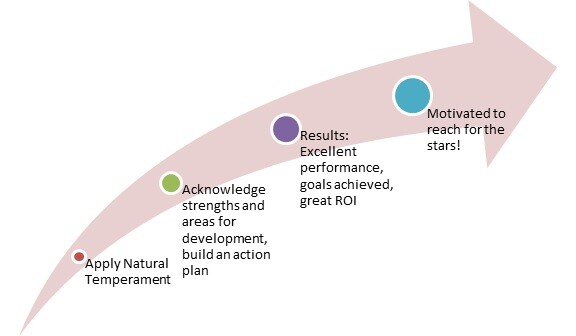In a post outlining a four-step coaching process, I listed a number of powerful tools coaches should have in their toolbox to ensure success. Today, I want to explore one of those tools: acknowledging and championing your employees.
I’ve always believed that we have a choice to either raise people up to their greatest potential, or hold them back. It can sometimes be too easy to resort to criticism and judgment, but a conscious and aware leader knows the value of acknowledging and championing their employees.
It’s important to inspire the best in your employees. Having them apply the strengths associated with their natural temperament to their job leads to more productive results, especially when their temperament is the right fit for the job to begin with. When you acknowledge employee’s accomplishments and champion them by telling them what you know to be true about them, you ignite their imagination of what else is possible and motivate them to achieve greater results by reaching for the stars.
Acknowledgment is a source of encouragement. Receiving it from you helps them to build trust in themselves, and that leads to the confidence to make any required changes to achieve desired results, and to advance further. With this in mind, your acknowledgment is most effective when it focuses on those natural behaviors that, when acted upon, enable the employee to take action to leverage or change their behavior in a way that improves performance.
Consistent acknowledgment over the long term will build awareness and confidence in their abilities. As a coach, your goal is to assist the employee in becoming more conscious and more self-aware; strengthening the trust they have in them self. When we strengthen the inner trust, meeting performance goals will be easier.
Acknowledgment isn’t always about addressing an employee’s strengths. Sometimes we need to acknowledge their developmental opportunities, too. When an employee is not performing at the level required for the job, nor demonstrating the needed knowledge, acknowledging this area as an opportunity for development can be an empowering way to address these areas of concern in a positive, productive way. And it’s important to make sure that the area of development does not undermine the employee’s strengths. As a coach, you can champion the employee by framing the opportunity in a positive way.

A key to successful use of acknowledgment in the process of coaching is to use a personal action plan that is based on a key strength or development opportunity. If you have an assessment tool like McQuaig, you can use something like our Self-Development Assessment that provides more in-depth insight into these areas of the employee and will assist you in coaching them to reach for the stars. It’s time to acknowledge your employees.